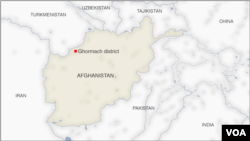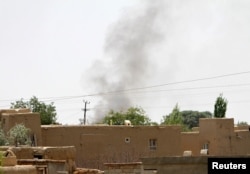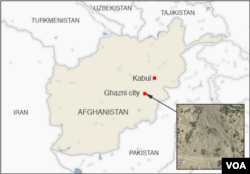Taliban militants have seized control of an army base in northern Afghanistan, killing and capturing dozens of government soldiers.
The fall of Camp Chenaya in the Ghormach district of Faryab province late Monday followed two days of intense fighting. Officials say the Afghan National Army (ANA) base was lost after soldiers failed to receive reinforcements and air support, and ran out of ammunition and other supplies.
Regional military and government officials Tuesday confirmed to VOA that 40 of the 70 soldiers stationed at the base surrendered to the Taliban. They said the rest have either been killed or fled to nearby mountains during the clashes.
The capture of Camp Chenaya comes as Afghan security forces, with the help of U.S. airstrikes and military advisors, regained control of the southeastern strategic city of Ghazni following days of deadly fighting with the Taliban.
The Afghan Defense Ministry spokesman, Jawed Ghafoor, told VOA that security forces have cleared the central parts of the city of insurgents and that cleanup operations were underway on the outskirts of Ghazni.
Separately, provincial governor Waheedullah Kalemzai, confirmed to VOA by phone that insurgents have been flushed out of the capital city. “Afghan security forces currently are conducting clearing operations in four areas of the city and life is returning to normalcy in Ghazni.”
There was no immediate reaction available from the Taliban.
Army officials have confirmed the killing of 100 Afghan soldiers and police personnel as well as 30 civilians since the Taliban assaulted the city on Friday, though local media gave much higher numbers of fatalities among government forces.
Defense Minister Gen. Tariq Shah Bahrami said Monday soldiers backed by allied airstrikes killed nearly 200 insurgents, including Arab, Chechen and Pakistani nationals.
U.N. officials said they were still trying to verify reports that the fighting for the control of Ghazni has resulted in up to 150 civilian casualties.
But Taliban spokesman Zabihullah Mujahid swiftly rejected the official claims, saying insurgents have surrounded Afghan forces in parts of the city.
It was not possible to independently confirm the claims. Insurgents often issue inflated details about their battlefield gains.
A U.S. military statement Monday said the city remains under Afghan control. It said U.S. advisers are assisting Afghan forces, and since Friday U.S. “airpower has delivered decisive blows to the Taliban, killing over 140.”
A spokesman for the U.S. military, Lt. Col. Martin O'Donnell, said "the isolated and disparate Taliban forces remaining in the city do not pose a threat to its collapse, as some have claimed.''
"That said, clearing operations are ongoing and sporadic clashes with the Taliban, particularly outside the city, continue," he said.
The provincial capital is located on the main highway linking northern and southern Afghan provinces, including the national capital of Kabul. The fighting had brought traffic to a halt, stranding thousands of passengers for the past five days.
The International Committee for the Red Cross said a break in the fighting Monday allowed its staff to provide the provincial hospital with fuel and emergency medical supplies.
Residents and staff said the facility was running out of space.
Acting U.N. Humanitarian Coordinator for Afghanistan Rik Peeperkon called Monday for the warring sides to take urgent steps to mitigate the suffering of Ghazni’s besieged residents and protect civilian lives.
“Vital telecommunications networks and the electricity supply are down in the city of 270,000 people, which has impacted on the water supply, and food is also reportedly running low. ... Notably, parties to the conflict need to ensure that access to medical services is not denied and respect for medical facilities and staff is upheld,” Peeperkon said.
Hostilities in Ghazni have disrupted telecommunication services, making it nearly impossible to verify conflicting claims about the fighting.







